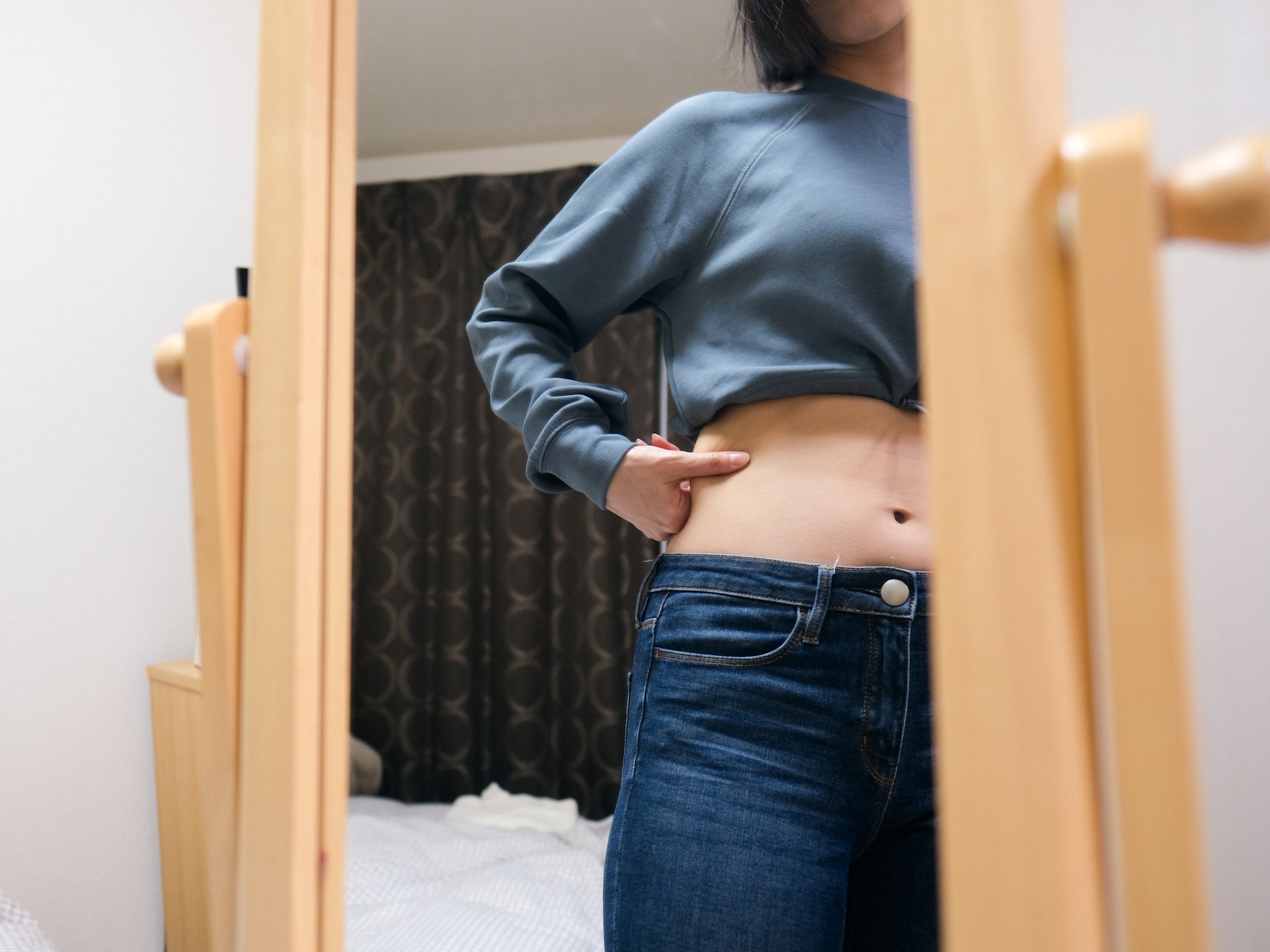“Skinny is the new rich,” says one TikTok user. In this video, a slim, blonde, white woman is speaking directly to the camera from the driver's seat of her car. “If you’re skinny [it] means you have something everyone wants. Your body is your business card. What is yours saying about you right now?”
This creator found fame on TikTok in the wake of “skinnytok” – a hashtag used by TikTok users to share videos about weight loss and exercise. The hashtag was banned by TikTok last month, following a wave of criticism which posited that the app was allowing content which directly encouraged disordered eating.
TikTok responded by saying it had, "blocked search results for #skinnytok since it has become linked to unhealthy weight loss content." Now, searches for skinnytok direct users towards mental health resources instead of videos like the one made by the “skinny is the new rich” creator. But at the time it was banned, the hashtag had almost half a million videos associated with it.
Banned but not forgotten
Despite the ban, videos promoting extreme thinness and vilifying weight gain are still rife and easy to find on the app. Often, pro-weight loss videos take a “no nonsense” approach, telling viewers that weight gain is the result of being lazy and undisciplined, and that thinness is a mindset that they must work to achieve.
“Just decide that you are done being fat,” says one TikTok user in a video addressing the camera. In another video, the same creator tells viewers to “trick themselves into being skinny” by telling themselves that they get easily full or that sugary foods upset their stomach. Both videos use the hashtag #toughloveskinnymotivation at the time of viewing.
While these creators claim to simply be providing health and wellness advice to people who want to lose or manage their weight, experts argue that much of this advice could be actively harmful.
“[These videos] contribute to an environment that makes these kinds of behaviours seem normal,” explains eating disorder specialist Sophie Corbett, who makes videos on her own social media channels debunking skinnytok-esque advice. She explains that eating disorders are a combination of predisposition and environmental factors, so social media content that normalises wanting to be skinny at any cost, could lead people “down a road towards disordered eating”.
Corbett says the risks are particularly acute for young people, who may not have a critical awareness of the harms of diet culture and may be more easily swayed by influencers telling them that being skinny will make them happy.
One of the main culprits of selling thinness as a lifestyle, was Liv Schimdt, whose name has become synonymous with skinnytok – despite TikTok banning her account last autumn. Schmidt has continued to post diet advice content on other platforms such as Instagram and YouTube, where she has 329K and 107K followers, respectively. On YouTube, she posts videos with titles like “act fat, get fat”.
In July, a YouTube spokesperson told the Wall Street Journal that they had removed three of Schimdt’s videos for violating its suicide, self-harm and eating disorders policy.
Read more: The truth behind ex-vegan influencers now selling organ meat supplements

Algorithms continue to push weight loss
Some social media users, particularly those who have struggled with disordered eating in the past, say that the proliferation of skinny content across social media has been distressing and caused them to either change their social media habits, or stay off certain platforms altogether.
“Whenever skinnytok appears on my carefully curated feed (something which I try to maintain potentially triggering or toxic content at bay) I feel completely let down. It feels like my phone is telling me to lose weight, that I’m not good enough – something that I have personally worked hard to accept isn’t true. These people are promoting starvation and spreading the belief that you are not valid as a woman, or beautiful, or worthy of people’s time if you’re not skinny,” says Emma Hill, a 29 year-old from Surrey, who first started struggling with disordered eating when she was 14.
Emma explains that she keeps all her social media accounts private and regularly goes through her following to make sure she doesn’t follow any accounts that discuss or promote weight loss. “This all works most of the time, but recently, diet culture and skinnytok has been pushed a lot harder,” she says, explaining that she is having to do more work to keep weight loss content out of her feed.
Lisa*, a 32-year-old creative based in London developed disordered eating while at university. She says she felt “sucked in” to skinnytok and weight loss content. While she has tried to block all diet or weight loss content, she says TikTok’s algorithm – which takes into account how long someone has lingered on, watched or interacted with a video – has pushed diet content onto her For You Page.
“The way that TikTok works means that, just by watching a so-called skinnytok clip, I'm served more of the same content, even if I don't like or engage with it. I am mindful to never interact with it, and I try to scroll past quickly so that I'm not served more in my feed. However, sometimes my disordered habits win out, and I end up watching a video, which means I get more of the same in my FYP feed and the cycle begins again.
“It can start with a video about a vegan lunch recipe, which becomes 10 low-sugar vegan swaps and before you know it, I'm asking ChatGPT to create me a low-calorie, low-sugar vegan diet plan.” she adds.
Read more: ‘Wellness washing’ is tricking us all into thinking we’re healthy, and it’s only getting worse
Amelie Thomas-Green, a 22-year-old from Kent who previously suffered with an eating disorder, says that the amount of pro-skinny content being recommended to her led her to delete TikTok and consider getting off social media altogether. “It makes me angry because I have spent so much of my life recovering from this type of rhetoric, but other people can spread it freely, and profit off the insecurity of so many,” she says. “I worry for younger people being exposed to it.”
In a report from 2022, the CCDH (Center for Countering Digital Hate) found that TikTok began recommending content glorifying disordered eating to accounts for teenagers within just eight minutes. Accounts for vulnerable teens, such as those with terms like “loseweight” in their usernames were significantly more likely to be recommended content relating to eating disorders or self-harm.
“Algorithms are playing a direct role in pushing users toward more extreme versions of diet and wellness culture,” explains Callum Hood, Head of Research at the CCDH. “This is not just a passive reflection of user interest. TikTok's algorithm is designed to maximise engagement and watch time, even if that means serving a stream of disordered eating content, and videos romanticising self-harm.”
The same algorithms that reward increasingly extreme political content with comments and views are doing the same thing with diet and wellness content: driving viewers, who may start out looking for innocent tips on health, towards content that promotes dangerous advice. “These platforms are not broken. They are functioning exactly as intended,” Hood adds.
In a statement given to The Independent, a TikTok spokesperson said: "TikTok does not allow content that promotes disordered eating or dangerous weight loss behaviours and we build in safeguards to prevent repetitive content patterns. We age-restrict videos that idealise certain body types, redirect people that search for select phrases to expert support and provide in-app resources developed with leading health organisations to help protect and educate our community."

Extreme content becomes political
But it’s not just the algorithm responsible for an increased interest in weight loss content. Some researchers have drawn parallels between skinnytok content and a shift towards right-wing ideologies.
“Thinness and revolts against body positivity have been rising on the right in the past 10 years. Conservative organisations now preach to followers to keep themselves fit to be successful, to attract a partner, and start a family – as a way of fighting "the great reset",” explains Dr Cat Tebaldi, a post-doctoral researcher at the University of Luxembourg, who focuses on how the far-right creates in-group communities. The ‘great reset’ is a conspiracy theory popular among members of the far right, which claims that global elites staged the COVID-19 pandemic in order to implement an authoritarian world order.
She says that conservative social media influencers like tradwives display the benefits of conservative beliefs by showing off their healthy home-cooked food and their “superior healthy, slim and wholesome bodies.” Implying that traditional living is better for everyone, in contrast to more liberal lifestyles. “The fit, healthy and pretty bodies of the traditional families are signs – outward proof of the ‘superiority’ or the ‘naturalness’ of their way of life,” Telbadi explains.
As well as the rise of right-wing beliefs, Corbett believes a “perfect storm” of factors has led to the rise in extreme content regarding weight and body image online, including health anxiety after the COVID-19 pandemic, and the availability of GLP-1 weight-loss drugs.
“[During the pandemic] there was kind of a narrative around if you have bad COVID outcomes because you have a higher weight, that's your fault and you’re a drain on the NHS. Health anxiety and anxiety about food are quite common drivers for disordered eating and eating disorders,” says Corbett.
Corbett also notes an overlap in tactics used to de-programme people who have been in cults, or de-radicalise those with extreme beliefs, and treatments for eating disorders. She explains: “We get to know them, gain their trust, and very gently begin on the topic and hear their thoughts. If we go straight in and criticise the disordered behaviours, they often disengage from dietetic treatment.”
Her advice to anyone struggling with seeing extreme content online is to reduce the amount of time spent on social media. She suggests that even cutting down by 15 minutes a day can result in better body image. She also recommends that parents help young people build resilience in the face of dieting messaging, and urges them to communicate that “holding thinness to such a high level of importance is not healthy or normal.”
Read more: How to spot the symptoms of burnout and treat them, according to wellbeing experts
For Lisa, understanding the digital and political context which pro-skinny content exists in, is an important way for her to help manage her reaction to it. “The noughties were all about size zeros and circling celebrity cellulite on the cover of magazines, but a decade later there was a real body confidence movement that prompted a shift in self-acceptance for myself and others.
“Now, the pendulum is swinging back and being skinny is once again viewed as the ideal – I think this can be pinned down to the pushback on feminism. This creates an internal conflict within me [because] I know that shrinking myself and conforming to the 'ideal' body is basically playing into this – which totally goes against my views, as a very liberal feminist from working-class origins.
Ultimately, though, I try not to be so hard on myself because decades of conditioning have led me to feel this way about weight, and undoing that isn't as simple as turning off a light switch.”
While looking for healthy recipe ideas definitely doesn’t mean you’re falling down an alt-right pipeline, it’s important to be aware of what your algorithm might suggest next based on your searches. Be prepared to think critically about content suggesting calorie restriction or rapid weight loss. Rapid weight loss or starvation can be extremely dangerous, especially for teenagers and young people, who need fuel for brain and bodily development. It can be useful to ask yourself who is benefitting from the arguments being made in any content that enters your social feeds, but especially content offering advice on diet, weight and health.
If you feel overwhelmed by weight loss content on your feed, consider cutting back on the time you spend on social media or taking a break altogether.
If you’ve been affected by the topics explored in this story, reach out Beat, an eating disorder charity, via their helpline.
‘Wellness washing’ is tricking us all into thinking we’re healthy, and it’s only getting worse
Dr Megan Rossi on why your long-term health and happiness begins in your stomach
What is the great lock in fitness trend and is it actually sustainable?
‘Wellness washing’ is tricking us all into thinking we’re healthy
Gemma Ogston explains why adaptogens aren’t a trend
This one thing could be ruining your sleep – and you were told it would help it







